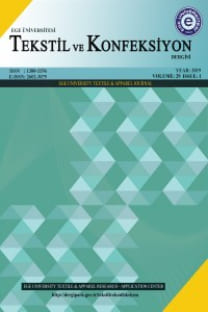Study on Single Jersey Knitted Fabrics Made from Cotton/ Polyester Core Spun Yarns. Part I: Thermal Comfort Properties
Air permeability Comfort, Thermal conductivity, Thermal resistance, Single jersey knitted fabrics, Water vapor permeability,
___
- Dhinakaran M., Sundaresan S., and Dasaradan B. S., 2014. Comfort Properties of Apparels. The Indian Textile Journal, 5, 45-48.
- Prakash, C., and Ramakrishnan, G., and Koushik, C.V., Study of Thermal Comfort Properties of Cotton/Regenerated Bamboo Knitted Fabrics. African Journal of Basic & Applied Sciences, 4(2), 60-66,
- ISSN: 1300-3356
- Yayın Aralığı: 4
- Yayıncı: Ege Üniversitesi Tekstil ve Konfeksiyon Araştırma & Uygulama Merkezi
Kıvanç GELERİ, Ayça GÜRARDA, Erhan Kenan ÇEVEN
Ceren GÖDE, İlker ERTUNA, Fatma KARAOĞLU, Aslı ATAR
Vidhya M, Parveen Banu K, Vasanthkumar D, Chidambaram PRAKASH, Subramaniam V
Gamze GÜLŞEN BAKICI, Füsun DOBA KADEM
Seray AKSOY, Cemil IŞILAK, Semih ERTÜRK, Semih OYLAR, Diren MECİT
Yeliz BURUK ŞAHİN, Ezgi AKTAR DEMİRTAŞ
Esin BABALIK, Sinem GÜNEŞOĞLU, Burçin ÜTEBAY, Ayşegül ÇETMELİ BAKADUR, Cem GÜNEŞOĞLU
